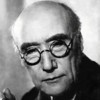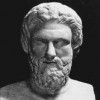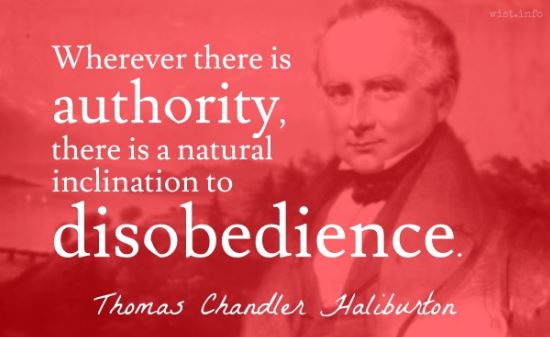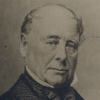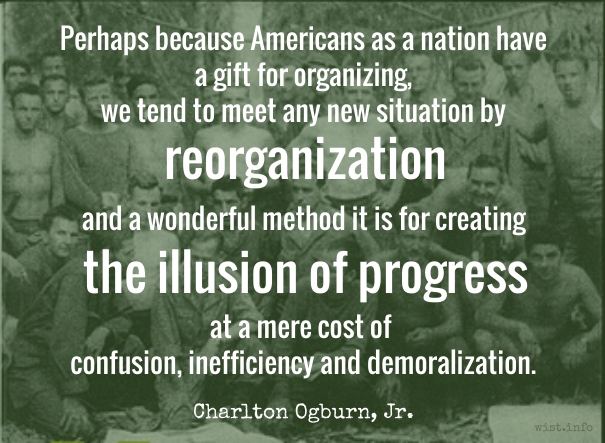Nothing is so silly as the expression of a man who is being complimented.
André Gide (1869-1951) French author, Nobel laureate
Journal (1906-02-13) [tr. O’Brien (1947)]
(Source)
Quotations about:
reaction
Note not all quotations have been tagged, so Search may find additional quotes on this topic.
Perhaps I know best why man alone laughs: he alone suffers so deeply that he had to invent laughter.
[Vielleicht weiss ich am besten, warum der Mensch allein lacht: er allein leidet so tief, dass er das Lachen erfinden musste.]
Friedrich Nietzsche (1844-1900) German philosopher and poet
The Will to Power [Der Wille zur Macht], Book 1, Part 2, ch. 2/b, § 91 (1901) [ed. Elisabeth Förster-Nietzsche] [tr. Kaufmann/Hollingdale (1967)]
(Source)
(Source (German)). Alternate translations:
Perhaps I know best why man is the only animal that laughs : he alone suffers so excruciatingly that he was compelled to invent laughter.
[tr. Ludovici (1910)]
Perhaps I know best why it is man alone who laughs; he alone suffers so deeply that he had to invent laughter.
[Common, e.g.]
Perhaps I know best why man alone laughs: only he suffers so profoundly that he was bound to invent laughter.
[tr. Hill/Scarpitti (2017)]
Bad reviews jar me down to the instep. I will never become philosophically resigned to a negative reaction to something I’ve written.
Rod Serling (1924-1975) American screenwriter, playwright, television producer, narrator
Patterns, Introduction (1957)
(Source)
He is as great a fool that laughs at all as he that weeps at all
[Tan necio es el que se ríe de todo como el que se pudre de todo.]
Baltasar Gracián y Morales (1601-1658) Spanish Jesuit priest, writer, philosopher
The Art of Worldly Wisdom [Oráculo Manual y Arte de Prudencia], § 209 (1647) [tr. Jacobs (1892)]
(Source)
(Source (Spanish)). Alternate translations:
He is as great a Fool that laughs at all things, as he that vexes at every thing.
[Flesher ed. (1685)]
As great a fool he who laughs at everything, as he who weeps over everything.
[tr. Fischer (1937)]
The person who laughs at everything is just as foolish as the one made wretched by everything.
[tr. Maurer (1992)]
Very few people have no opinions about cats. Even those who have never known a cat personally, scarcely even spoken to one, feel strongly and sometimes hysterically on the subject.
Act like the person you are, not the way they make you act.
[Cada uno ha de obrar como quien es, no como le obligan.]
Baltasar Gracián y Morales (1601-1658) Spanish Jesuit priest, writer, philosopher
The Art of Worldly Wisdom [Oráculo Manual y Arte de Prudencia], § 165 (1647) [tr. Maurer (1992)]
(Source)
On waging war honorably. (Source (Spanish)). Alternate translation:
All men ought to act according to what they themselves are, and not to what others are.
[Flesher ed. (1685)]
Every one must needs act as he is, not as others would make him to be.
[tr. Jacobs (1892)]
Each must act for what he is, and not for what he is held.
[tr. Fischer (1937)]
Life is political, not because the world cares about how you feel, but because the world reacts to what you do.
Timothy Snyder (b. 1969) American historian, author
On Tyranny: Twenty Lessons from the Twentieth Century (2017)
(Source)
“When it comes to strangers with guns,” I told her, “I think suspicion is more likely to keep you alive than trust.”
It’s one of those weird truths you learn early on as police that quite a high percentage of the public have all the survival instinct of a moth in a candle factory. They run the wrong way, they refuse to move, some will run toward the danger, and others will instantly whip out their phones and take footage.
Confront a child, a puppy, and a kitten with a sudden danger; the child will turn instinctively for assistance, the puppy will grovel in abject submission, the kitten will brace its tiny body for a frantic resistance.
H. H. Munro (1870-1916) Scottish writer [Hector Hugh Munro; pseud. Saki]
“The Achievement of the Cat” (1924)
(Source)
Humor is the most honest of emotions. Applause for a speech can be insincere, but with humor, if the audience doesn’t like it there’s no faking it.
Robert Orben (b. 1927) American comedy writer, magician, speechwriter
In “A Little Night Humor,” Washington Post (28 Jan 1982)
(Source)
How unhappy are women! Their own sex their most inveterate enemy. An husband tyrannizes; a lover dishonors and despises them. Watched on all sides, thwarted in all things; ever in fear and in constraint; without support or succour; with a number of lovers but not one friend. Is it then to be wondered at that they should become a compound of humor, dissimulation, and caprice?
Anne "Ninon" de l'Enclos (1620-1705) French author, courtesan, patron of the arts [Ninon de Lenclos, Ninon de Lanclos]
The Memoirs of Ninon de L’Enclos, Vol. 1, “Life and Character” (1761)
(Source)
I hate to be a kicker,
I always long for peace,
But the wheel that does the squeaking,
Is the one that gets the grease.Josh Billings (1818-1885) American humorist, aphorist [pseud. of Henry Wheeler Shaw]
“The Kicker” (c. 1870)
A "kicker" was idiom in the era for a complainer. This is a common citation for the origin of "the squeaky wheel gets the grease," but the existence of such a poem has never been verified. The earliest documented version of the phrase is in the Wall Street Journal (20 May 1910): "The wheel that squeaks the loudest / Is the wheel that gets the grease." The metaphor itself can be found in various versions back to at least the 15th Century.
Lesbian: Any uppity woman, regardless of sexual preference. If they don’t call you a lesbian, you’re probably not accomplishing anything.
Marie Shear (1940-2017) American writer and feminist activist
“Media Watch: Celebrating Women’s Words,” New Directions for Women (May/Jun 1986)
(Source)
EPOPS: You’re mistaken: men of sense often learn from their enemies. Prudence is the best safeguard. This principle cannot be learned from a friend, but an enemy extorts it immediately. It is from their foes, not their friends, that cities learn the lesson of building high walls and ships of war. And this lesson saves their children, their homes, and their properties.
CHORUS [LEADER]: It appears then that it will be better for us to hear what they have to say first; for one may learn something at times even from one’s enemies.
Aristophanes (c. 450-c. 388 BC) Athenian comedic playwright
The Birds, l. 375ff (414 BC) [tr. Anon. (1812), Ramage (1864)]
(Source)
Alt. trans. [Hickie (1853)]:
EPOPS: Yet, certainly, the wise learn many things from their enemies; for caution preserves all things. From a friend you could not learn this, but your foe immediately obliges you to learn it. For example, the states have learned from enemies, and not from friends, to build lofty walls, and to possess ships of war. And this lesson preserves children, house, and possessions.
CHORUS [LEADER]: It is useful, as it appears to me, to hear their arguments first; for one might learn some wisdom even from one's foes.
Alt. trans. [O'Neill (1938)]:
EPOPS: The wise can often profit by the lessons of a foe, for caution is the mother of safety. It is just such a thing as one will not learn from a friend and which an enemy compels you to know. To begin with, it's the foe and not the friend that taught cities to build high walls, to equip long vessels of war; and it's this knowledge that protects our children, our slaves and our wealth.
LEADER OF THE CHORUS: Well then, I agree, let us first hear them, for that is best; one can even learn something in an enemy's school.
The very act of trying to run counter to the culture is what creates the next wave of culture people will in turn attempt to counter.
David McRaney (contemp.) American journalist, author, lecturer
You Are Not So Smart, ch. 27 “Selling Out” (2011)
(Source)
If you can’t change your fate, change your attitude.
Abuse is a proof that you are felt. If they praise you, you will work no revolution.
Revolutions, as a long and bitter experience reveals, are apt to take their colour from the régime which they overthrow. Is it any wonder that the creed which affirms the absolute rights of property should sometimes be met with a counter-affirmation of the absolute rights of labour, less anti-social, indeed, and inhuman, but almost as dogmatic, almost as intolerant and thoughtless as itself.
R. H. Tawney (1880-1962) English writer, economist, historian, social critic [Richard Henry Tawney]
The Acquisitive Century, ch. 3 “The Acquisitive Society” (1920)
(Source)
We begin to notice, besides our particular sinful acts, our sinfulness; begin to be alarmed not only about what we do, but about what we are. This may sound rather difficult, so I will try to make it clear from my own case. When I come to my evening prayers and try to reckon up the sins of the day, nine times out of ten the most obvious one is some sin against charity; I have sulked or snapped or sneered or snubbed or stormed. And the excuse that immediately springs to my mind is that the provocation was so sudden and unexpected; I was caught off my guard, I had not time to collect myself.
Now that may be an extenuating circumstance as regards those particular acts: they would obviously be worse if they had been deliberate and premeditated. On the other hand, surely what a man does when he is taken off his guard is the best evidence for what sort of a man he is? Surely what pops out before the man has time to put on a disguise is the truth? If there are rats in a cellar you are most likely to see them if you go in very suddenly. But the suddenness does not create the rats: it only prevents them from hiding. In the same way the suddenness of the provocation does not make me an ill-tempered man; it only shows me what an ill-tempered man I am. The rats are always there in the cellar, but if you go in shouting and noisily they will have taken cover before you switch on the light.
C. S. Lewis (1898-1963) English writer, literary scholar, lay theologian [Clive Staples Lewis]
Mere Christianity, “Let’s Pretend” (1952)
(Source)
It is a dear and lovely disposition, and a most valuable one, that can brush away indignities and discourtesies and seek and find the pleasanter features of an experience.
Mark Twain (1835-1910) American writer [pseud. of Samuel Clemens]
In The North American Review (1906)
(Source)
There are few mortals so insensible that their affections cannot be gained by mildness; their confidence by sincerity; their hatred by scorn or neglect.
Johann Georg Zimmermann (1728-1795) Swiss philosophical writer, naturalist, physician
Aphorisms and Reflections on Men, Morals and Things (1800)
(Source)
He’s suffering from Politicians’ Logic. Something must be done, this is something, therefore we must do it.
Never complain and never explain.
Benjamin Disraeli (1804-1881) English politician and author
(Attributed)
(Source)
Most often cited to John Morley, Life of William Ewart Gladstone, Vol. 1, Book 2, ch. 2, sec. 1 (1903). This was Disraeli's distillation of advice that Lord High Chancellor John Copley, Lord Lyndhurst, gave at a January 1835 dinner attended both a young Gladstone and Disraeli:
Never defend yourself before a popular assemblage, except with and by retorting the attack; the hearers, in the pleasure which the assault gives them, will forget the previous charge.
The phrase is also attributed to Benjamin Jowett, Henry Ford II, and Charles Stewart Parnell.
Terrorism’s goal is to commit frightening, high-profile crimes that scare people into making rash, expensive decisions that make the world look like the terrorists would like to see it.
Cory Doctorow (b. 1971) Canadian-British blogger, journalist, activist, author
“How terrorists trick Western governments in doing their work for them,” Boingboing.net (16 Nov 2015)
(Source)
There isn’t a way things should be. There’s just what happens, and what we do.
There is (usually) no crime in performing a jerk maneuver, or acting like a jerk. Everyone can, and has, acted like a jerk from time to time. It’s a regrettable but natural part of the human experience. But most people have the good sense to understand that acting like a jerk should not be a lifestyle choice, and that if you make it one, people will respond to you based on your choices.
John Scalzi (b. 1969) American writer
“Being a Jerk About the Hugos: Not as Effective a Strategy as You Might Think”, Whatever (blog) (24 Aug 2015)
(Source)
In reactive problem solving we walk into the future facing the past — we move away from, rather than toward, something. This often results in unforeseen consequences that are more distasteful than the deficiencies removed.
In my head there is a permanent opposition-party; and whenever I take any step or come to any decision — though I may have given the matter mature consideration — it afterward attacks what I have done, without, however, being each time necessarily in the right. This is, I suppose, only a form of rectification on the part of the spirit of scrutiny; but it often reproaches me when I do not deserve it.
[In meinem Kopfe giebt es eine stehende Oppositionspartei, die gegen Alles, was ich, wenn auch mit reiflicher Überlegung, gethan, oder beschlossen habe, nachträglich polemisirt, ohne jedoch darum jedesmal Recht zu haben. Sie ist wohl nur eine Form des berichtigenden Prüfungsgeistes, macht mir aber oft unverdiente Vorwürfe.]
Arthur Schopenhauer (1788-1860) German philosopher
Parerga and Paralipomena, Vol. 2, ch. 26 “Psychological Observations [Psychologische Bemerkungen],” § 345 (1851) [tr. Saunders (1890)]
(Source)
(Source (German)). Alternate translation:
There is in my mind a standing opposition party which subsequently attacks everything I have done or decided, even after mature consideration, yet without its always being right on that account. It is, I suppose, only a form of the corrective spirit of investigation; but it often casts an unmerited slur on me.
[tr. Payne (1974)]
Take this remark from Richard poor and lame,
Whate’er’s begun in anger ends in shame.Benjamin Franklin (1706-1790) American statesman, scientist, philosopher, aphorist
Poor Richard (1734 ed.)
(Source)
What is character but the determination of incident? What is incident but the illustration of character?
Henry James (1843-1916) American writer
“The Art of Fiction,” Longman’s Magazine (4 Sep 1884)
(Source)
BRUTUS: There is a tide in the affairs of men
Which, taken at the flood, leads on to fortune;
Omitted, all the voyage of their life
Is bound in shallows and in miseries.
On such a full sea are we now afloat,
And we must take the current when it serves
Or lose our ventures.William Shakespeare (1564-1616) English dramatist and poet
Julius Caesar, Act 4, sc. 3, l. 249ff (4.3.249-255) (1599)
(Source)
A man who does not possess himself enough to hear disagreeable things without visible marks of anger and change of countenance, or agreeable ones without sudden bursts of joy and expansion of countenance, is at the mercy of every artful knave or pert coxcomb.
Life is 10 percent what you make it and 90 percent how you take it.
Irving Berlin (1888-1989) American songwriter [b. Isidore Beilin]
(Attributed)
(Source)
Attributed as a comment made by Berlin during a performance of the show This is the Army, Mr. Jones at the Palladium in London in 1943.
Also sometimes attributed to Benjamin Franklin.
The degree of one’s emotions varies inversely with one’s knowledge of the facts — the less you know the hotter you get.
Every body and every thing conspire to make me as contented as possible in it; yet I have seen too much of the vanity of human affairs, to expect felicity from the splendid scenes of public life. I am still determined to be cheerful and to be happy, in whatever situation I may be; for I have also learnt, from experience, that the greater part of our happiness or misery depends upon our dispositions, and not upon our circumstances. We carry the seeds of the one or the other about with us, in our minds, wheresoever we go.
Martha Washington (1731-1802) American socialite, wife of George Washington, First Lady (1789-1797)
Letter to Mercy Otis Warren (1789-12-26)
(Source)
Life is made up of constant calls to action, and we seldom have time for more than hastily contrived answers; to follow one’s hunch is usually better than lying doggo, and rough generalizations that have worked well in the past easily easily take on the authority of universals. It does violence to our inner being to be obliged to give a hearing to opinions widely at variance with those we are accustomed to, and to come to a conclusion unweighted by desire.
Learned Hand (1872-1961) American jurist
“At Fourscore,” speech, Harvard Club of New York (1952-01-18)
(Source)
First published in the Harvard Alumni Bulletin (23 Feb 1952).
The meaning of things lies not in the things themselves but in our attitude towards them.
Antoine de Saint-Exupéry (1900-1944) French writer, aviator
Citadelle [The Wisdom of the Sands], ch. 5 (1948) [tr. Gilbert (1950)]
(Source)
When Miss Manners observes people behaving rudely, she never steps in to correct them. She behaves politely to them, and then goes home and snickers about them afterward. That is what the well-bred person does.
Judith Martin (b. 1938) American author, journalist, etiquette expert [a.k.a. Miss Manners]
Miss Manners’ Guide to Excruciatingly Correct Behavior, Introduction (1983)
(Source)
We trained hard, but it seemed that every time we were beginning to form up into teams we would be reorganized. Presumably the plans for our employment were being changed. I was to learn later in life that, perhaps because we are so good at organizing, we tend as a nation to meet any new situation by reorganizing; and a wonderful method it can be for creating the illusion of progress while producing confusion, inefficiency and demoralization.
Charlton Ogburn, Jr. (1911-1998) American journalist, author
“Merrill’s Marauders: The truth about an incredible adventure,” Harper’s Magazine (Jan 1957)
In his 1959 book, The Marauders, Ogburn rephrased this as: "As a result, I suppose, of high-level changes of mind about how we were to be used, we went through several reorganizations. Perhaps because Americans as a nation have a gift for organizing, we tend to meet any new situation by reorganization, and a wonderful method it is for creating the illusion of progress at a mere cost of confusion, inefficiency and demoralization."
Sometimes incorrectly cited to Gaius Petronius Arbiter. For more on this quotation, see here.
Act nothing in furious Passion; it’s putting to Sea in a Storm.
Thomas Fuller (1654-1734) English physician, preacher, aphorist, writer
Introductio ad Prudentiam, Vol. 1, # 365 (1725)
(Source)
People who like this sort of thing will find this the sort of thing they like.
Abraham Lincoln (1809-1865) American lawyer, politician, US President (1861-65)
(Attributed)
One of the earliest references to something like this was in an 1863 newspaper ad for Lincoln’s favorite humorist, Artemus Ward, that included this faux testimonial (possibly written by Ward): “I have never heard any of your lectures, but from what I can learn I should say that for people who like the kind of lectures you deliver, they are just the kind of lectures such people like. Yours respectfully, O. Abe.”
Quoted in G.W.E. Russell, Collections and Recollections, ch. 30 (1898), regarding “an unreadably sentimental book.”
According to Anthony Gross, Lincoln’s Own Stories (1902), Lincoln’s was speaking to Robert Dale Owen, who had insisted on reading to Lincoln a long manuscript on spiritualism. "Well, for those who like that sort of thing, I should think it is just about the sort of thing they would like."
In Emanual Hertz, ed., "Father Abraham," Lincoln Talks: A Biography in Anecdote (1939), the response was to a young poet asking him about his newly published poems.
More discussion of this quotation: Ralph Keyes, The Quote Verifier.

